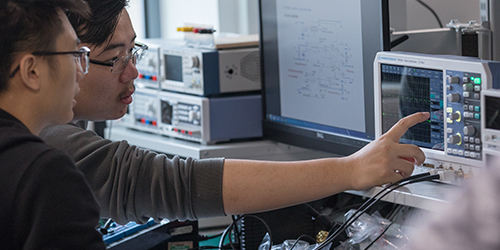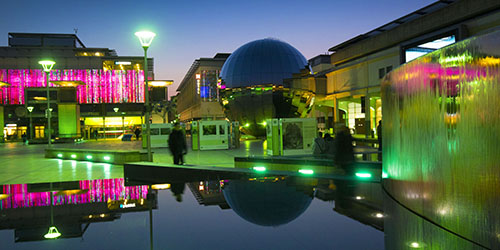Electrical and Electronic Engineering
Help create and shape the sustainable technologies of the future.
Industry links
Benefit from our dedicated Industrial Liaison Office, which develops engineering-specific links between students and industry.
Exclusive opportunities
We offer scholarships including the UK Electronics Skills Foundation and E3 Academy Scholarship, plus placement and employment opportunities.
Outstanding facilities
We have invested more than £20 million in a state-of-the-art electrical laboratory, as well as workshops and flexible spaces for teaching and design.
Electrical and Electronic Engineering courses for 2024
Single Honours
- BEng Electrical and Electronic Engineering (H600)
- BEng Electrical and Electronic Engineering with a Year in Industry
- BEng Mechanical and Electrical Engineering (H361)
- BEng Mechanical and Electrical Engineering with a Year in Industry
- MEng Electrical and Electronic Engineering (H606)
- MEng Electrical and Electronic Engineering with Innovation (H604)
- MEng Electrical and Electronic Engineering with Study Abroad
- MEng Electrical and Electronic Engineering with Study Abroad in a Modern Language (H605)
- MEng Electrical and Electronic Engineering with a Year in Industry
- MEng Mechanical and Electrical Engineering (H360)
- MEng Mechanical and Electrical Engineering with a Year in Industry
Electrical and Electronic Engineering at Bristol
Electrical and electronic engineering is one of the broadest engineering disciplines and uses technology to address some of the world's major concerns.
Using cutting-edge technologies in fields such as power generation, transport, medicine, quantum information, computing, artificial intelligence, cryptography and communications, electrical and electronic engineers are developing solutions that will shape our future.
You will learn from world-renowned experts, apply your knowledge in our state-of-the-art laboratories, and benefit from outstanding industrial links and opportunities for scholarships and placements.
The best thing about my course is the amount of practical project work. The even balance of practical and theoretical learning really prepares you for the challenges of working in industry.
Career prospects

You will be encouraged to lead, to think in innovative ways, and to challenge existing practice - equipping you with the skills and confidence to make a difference.
Our Industrial Liaison Office supports you to engage with potential employers from year one of your study. They also offer insightful lectures, mentoring and internship schemes.
Demand is growing for skilled graduates to work in industries such as consumer electronics, alternative energy and transport, medical engineering and communications.
Given the highly transferable skillset gained during study, our graduates also pursue careers outside of engineering in fields such as finance and digital media. Recent examples of graduate employers include Jaguar Land Rover, Siemens, Hewlett-Packard, Intel, BBC, Dyson and EDF Energy.
What our students do after graduatingCourse structure

We offer three-year BEng degrees and four-year MEng degrees. The MEng options provide more breadth and depth.
On the Electrical and Electronic Engineering course, year one provides a strong grounding in mathematics, computing, analogue and digital electronics, communications, electromagnetics, power electronics and control. You'll also take laboratory sessions and will be encouraged to start designing hardware and software solutions in collaboration with your lab partners.
In later years, you will choose from a range of optional units, meaning you can focus on anything from electrical power systems to electronic communications. MEng students will undertake a major group project in addition to an individual research project.
There are options to study abroad in your third year. Current destinations include France, Germany, Spain, the US and Australia. To find out more about studying abroad, visit the Centre for Study Abroad.
If you choose to study Electrical and Electronic Engineering with Innovation, you will work with interdisciplinary breadth and creative teamwork to develop entrepreneurial skills. There is also the opportunity to pursue a joint honours degree with Mechanical Engineering.
Ideal location

Bristol is home to one of Europe's largest clusters of micro-electronics and hi-tech industries, the UK's biggest aerospace companies, renewable energy enterprises, and a thriving creative media industry, making it an ideal location in which to study electrical and electronic engineering.
